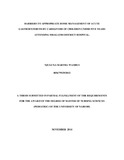| dc.contributor.author | Njuguna, Martha W | |
| dc.date.accessioned | 2014-12-08T07:53:52Z | |
| dc.date.available | 2014-12-08T07:53:52Z | |
| dc.date.issued | 2014-11 | |
| dc.identifier.citation | Degree Of Master Of Nursing Sciences (Pediatric) ,2014 | en_US |
| dc.identifier.uri | http://hdl.handle.net/11295/76509 | |
| dc.description.abstract | Diarrhoea is the third leading cause of under five mortality in Kenya. It accounts for 4.7% of all outpatient cases countrywide. Caregivers have been identified to play a vital role in appropriate management of acute gastroenteritis and thus the development of C-IMCI by WHO with clear guidelines on appropriate home treatment of acute gastroenteritis. Despite the presence of the guidelines, research findings still indicate that majority of caregivers do not manage acute gastroenteritis appropriately at home. This study sought to determine the barriers to appropriate home management of acute gastroenteritis by caregivers of children under five years attending Mbagathi district Hospital. A descriptive cross-sectional design utilizing qualitative and quantitative approaches was used to obtain data from caregivers of children under five years presenting at Mbagathi District Hospital (MDH) with acute gastroenteritis. Simple random sampling was used to select 209 caregivers who were interviewed using a structured questionnaire while convenience sampling was used to select 16 caregivers who participated in focus group discussions (FGD).Two FGD’s were conducted. The study was carried out over a period of two months. Qualitative data was transcribed and coded in to themes. Quantitative data was analyzed using software Statistical Package for Social Sciences (SPSS) version 21.0 computer package. The significant levels were set at p<0.05 for all test. The study found that fluid intake was increased by most caregivers and there was a correlation between fluid intake and caregivers marital status, occupation and child’s gender with p-value of <0.0001, 0.004 and 0.049 respectively. Spouse occupation and decision maker were significantly associated with use of ORS at p-value 0.029 and 0.043 respectively. Food withholding was reported by 29.7% (n=55) of the caregivers and 36.4% (n=76) had used other medications. Zinc supplements were administered to 38% (n=79) of children and caregivers. Cultural beliefs, perceived cause of illness, financial capability and prescriber practices were identified to influence caregivers’ choice of treatment. Majority of caregivers did not adhere to the recommended guidelines in home management of diarrhoea. Insufficient knowledge, cultural beliefs, prescriber practices and perceived cause of diarrhoea were identified as barriers to appropriate home management. | en_US |
| dc.language.iso | en | en_US |
| dc.publisher | University of Narobi | en_US |
| dc.title | Barriers to appropriate home management of acute gastroenteritis by caregivers of children under five years attending Mbagathi district hospital. | en_US |
| dc.type | Thesis | en_US |
| dc.description.department | a
Department of Psychiatry, University of Nairobi, ; bDepartment of Mental Health, School of Medicine,
Moi University, Eldoret, Kenya | |
| dc.type.material | en_US | en_US |

